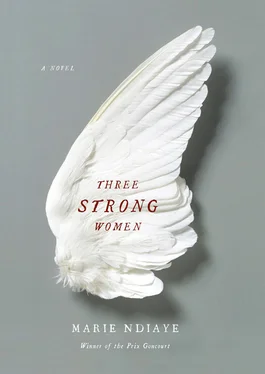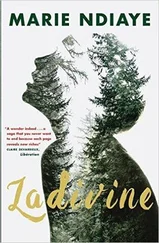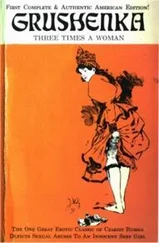He could have answered, with a snicker, “No risk of that, I haven’t been sleeping with Fanta for a long time, or, rather, she’s not been sleeping with me.”
But he could also have replied, with a cry of despair, “But it was you, Mummy, who got me taken on at Manille’s, it was you who went and begged him to give me a job! Had it not been for that, he’d never have met her!”
But he had no recollection of having opened his mouth, frozen as it was in a slack, feeble rictus.
He could see himself again, his own impassive face in the mirror, and just under it the back of the head of this woman who was still talking, still trying to drown him in vile, sneaky appeals to his male honor, and hadn’t he then thought that a simple blow to that head, with its short, dyed blond hair, would free him from this torment, hadn’t he seen himself striking Mummy to shut her up, shouting at her perhaps, just before she lost consciousness, “What do you know of honor, eh, and Dad, what did he know of it?”
But he didn’t want to think about it anymore.
It was humiliating and pointless and made you feel grubby, as if you were emerging from a recurring, interminable, stupid dream: you’re only too familiar with every painful stage of it, and even while plunged in it you know that you’re not going to be allowed to skip a single episode.
He didn’t want to think about it anymore.
He switched on the ignition again and put the car straight into second gear.
The engine protested and spluttered, then, slowly, the Nevada began to move forward, with fits and moans from every part of its ancient carcass but, he said to himself with some satisfaction, rather spunky, all things considered.
He wouldn’t think about that anymore.
He lowered the window and, steering with one hand, let his left arm hang over the hot side of the car. He could occasionally hear the melting surface of the asphalt crackling under his tires.
How he loved that sound!
He was now experiencing a gentle, delightful feeling of euphoria.
No, by Mummy’s good little god, our kind little father, he wouldn’t think about the mortifying past anymore but only about making himself worthy of the love Fanta would feel for him again if he cared to make the effort, and didn’t he just, as heaven was his witness, high, bright, and scorching hot this very morning. Why, for once, shouldn’t the best be Rudy Descas’s for the asking, the finest and the most certain of the innumerable promises offered by the sun this fine spring morning?
He suddenly burst out laughing.
The sound of his own voice enchanted him.
After all, he thought, almost surprised, he was alive, still young, and in perfect health.
Could Gauquelan himself, that crook whose loathsome sculpture he was circling around at that moment (and today he found the strength not to look at it), with his ill-gotten gains, could he claim as much?
Certainly not.
Alive, alas yes, but the photo Rudy had seen in the paper showed a man with a rather puffy, scowling face, a receding hairline, a tuft of graying hair on top, and, curiously, a gap in his front teeth, and it had occurred to Rudy then, as he now recalled, feeling slightly ashamed, that a man who got paid a hundred thousand euros for a hideous piece of sculpture should surely have been able to avoid the cameras until he got his teeth fixed.
The manner of Gauquelan’s existence was as nothing compared with Rudy’s own impressive vitality, which he — Rudy — felt throbbing in his every muscle as if he were a horse (or a centaur), a big, proud, young beast, the whole purpose of whose existence was in being a superb specimen, his spirit never again to be seized by those dreams that leave you with a pasty mouth and stale breath, any more than the spirit of a horse (or a centaur) would be.
Was Mummy alive?
After the rotary, without intending to, he accelerated sharply.
He’d no business thinking about Mummy at that moment, nor about his father; he (his father) was well and truly dead, and no one would ever remotely have thought of comparing him to a horse (or a centaur) with rippling muscles under his damp skin — damp as Rudy’s cheeks, neck, and forehead were in the un-air-conditioned car, a reaction of his system, he recognized, to his having evoked, however briefly and insignificantly, his long-dead father, the terror and astonishment always provoked in him by the thought of that white-boned skeleton formerly called Abel Descas, its very white bones and the hole neatly drilled through its skull, lying, Rudy imagined, in the hot sandy soil of the cemetery at Bel Air.
He parked the Nevada in the parking lot of Manille & Co.
Before getting out, he carefully mopped his face and neck with the towel that he kept on the backseat for this purpose and that had eventually absorbed the smell of the car.
Each time he promised himself he’d change it, then he’d forget, and so his annoyance was intense when he reached for the towel and found this nauseating rag once again, because it seemed to him that this minor testimony to his own negligence, obliging him to wipe his face with a dubious piece of cloth, represented his whole current existence in its vaguely grimy disorder.
But this morning, just as he hadn’t managed to suppress a reflex of irritation in wiping his face, he succeeded in forcing himself to let his eyes wander over the different cars parked around him and evaluate them in the most neutral manner possible, without succumbing, as he usually did, to the bitter, violent feelings of envy that he found so degrading.
So that’s what my colleagues and customers drive, he said calmly, almost ritually, to himself, as he itemized the black and gray Audis, Mercedeses, and BMWs that made the parking lot of a kitchen showroom on the outskirts of a small provincial town look like a grand hotel.
Where do they get so much money?
How are they able to extract from their hardworking existence the sums needed to buy such cars? I’ve not the slightest idea.
What’s their scheme, what knack do they possess, what’s the trick? I’ll never figure it out.
And other pointless questions like that swirled around in his furious mind as he slammed the door of the Nevada.
But he’d been able, this morning, to resist the monotonous surge of covetousness.
With a light step he crossed the lot and dimly recalled feeling much the same during an earlier time in his life when he always walked like that: light of foot and at peace with himself — yes, always like that, and looking serene and benevolent — that was the face he always showed to the world.
It all seemed so remote to him that he almost doubted it had anything to do with him — him, Rudy Descas — and not his father or someone else he’d dreamed about.
How long ago was all that?
He thought it must have been when he returned to Dakar alone, without Mummy, who’d stayed in France, shortly before he met Fanta.
He thought too, with a start, because it was a detail he’d forgotten, that for him, then, it used to seem natural, that inclination to be good and kind.
He stopped suddenly in the sun-drenched parking lot.
The smell of hot tar filled his nostrils.
He had quite a surprise when he looked not at the sky but at the bitumen under his feet.
Had he really been that lighthearted man, at peace with himself, who strode along the placid streets of Le Plateau, where he’d rented a small apartment, looking, with his fair hair and pleasantly regular features, hardly any different from the other white-faced types who he passed in the neighborhood but whose business ambitions and drive he in no way shared?
Could he really have been that man, Rudy Descas, who aspired, with calm self-scrutiny, to show himself good and just, and even more (oh, how that made him blush with surprise and embarrassment) to always distinguish good from evil in himself, never favoring the latter even when it appeared under the mask of good as happened all too often here when one was a white man with deep pockets and could for very little buy any kind of labor involving great patience and endurance?
Читать дальше












